Top Rankings
Mcdowell County Schools School District ranks among the top 20% of public school district in North Carolina for:
Category
Attribute
Community Size
Largest student body (number of students) (Top 1%)
For the 2025 school year, there are 8 public preschools serving 2,635 students in Mcdowell County Schools School District. This district's average pre testing ranking is 7/10, which is in the top 50% of public pre schools in North Carolina.
Public Preschools in Mcdowell County Schools School District have an average math proficiency score of 53% (versus the North Carolina public pre school average of 51%), and reading proficiency score of 47% (versus the 46% statewide average).
Minority enrollment is 23% of the student body (majority Hispanic), which is less than the North Carolina public preschool average of 59% (majority Black and Hispanic).
Overview
This School District
This State (NC)
# Schools
16 Schools
994 Schools
# Students
5,617 Students
464,055 Students
# Teachers
387 Teachers
33,275 Teachers
Student : Teacher Ratio
15:1
15:1
District Rank
Mcdowell County Schools School District, which is ranked within the bottom 50% of all 320 school districts in North Carolina (based off of combined math and reading proficiency testing data) for the 2021-2022 school year.
The school district's graduation rate of 80% has decreased from 85% over five school years.
Overall District Rank
#168 out of 325 school districts
(Bottom 50%)
(Bottom 50%)
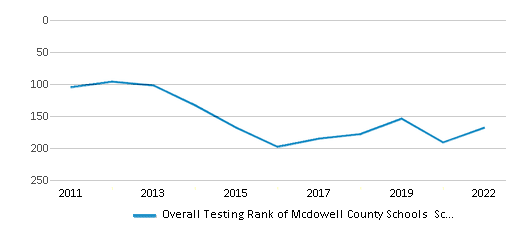
Math Test Scores (% Proficient)
51%
51%
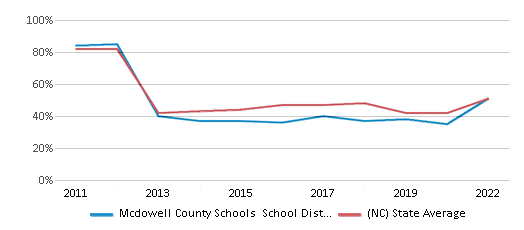
Reading/Language Arts Test Scores (% Proficient)
48%
50%
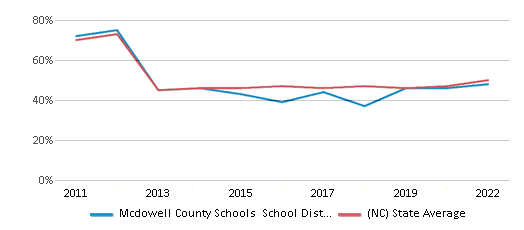
Science Test Scores (% Proficient)
63%
63%
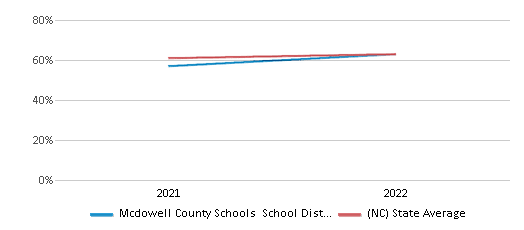
Graduation Rate
80%
86%
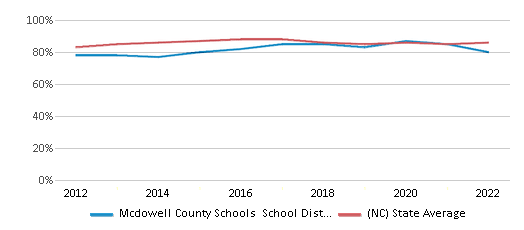
Students by Ethnicity:
Diversity Score
0.41
0.72
# American Indian Students
10 Students
6,572 Students
% American Indian Students
n/a
1%
# Asian Students
49 Students
18,458 Students
% Asian Students
1%
4%
# Hispanic Students
854 Students
105,943 Students
% Hispanic Students
15%
23%
# Black Students
175 Students
114,509 Students
% Black Students
3%
25%
# White Students
4,272 Students
189,147 Students
% White Students
76%
41%
# Hawaiian Students
2 Students
648 Students
% Hawaiian Students
n/a
n/a
# Two or more races Students
299 Students
28,778 Students
% of Two or more races Students
5%
6%
Students by Grade:
# Students in PK Grade:
209
23,104
# Students in K Grade:
390
72,144
# Students in 1st Grade:
400
74,289
# Students in 2nd Grade:
409
75,942
# Students in 3rd Grade:
399
68,925
# Students in 4th Grade:
423
69,686
# Students in 5th Grade:
405
66,668
# Students in 6th Grade:
365
5,021
# Students in 7th Grade:
407
3,684
# Students in 8th Grade:
437
3,629
# Students in 9th Grade:
442
214
# Students in 10th Grade:
475
194
# Students in 11th Grade:
404
187
# Students in 12th Grade:
452
368
# Ungraded Students:
-
-
District Revenue and Spending
The revenue/student of $11,591 is higher than the state median of $11,187. The school district revenue/student has stayed relatively flat over four school years.
The school district's spending/student of $11,818 is higher than the state median of $11,612. The school district spending/student has stayed relatively flat over four school years.
Total Revenue
$65 MM
$17,307 MM
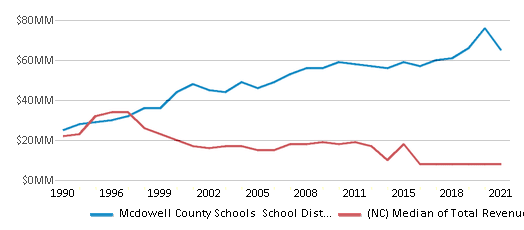
Spending
$66 MM
$17,964 MM
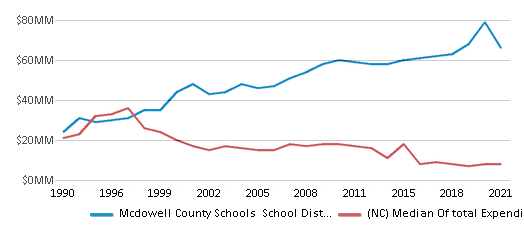
Revenue / Student
$11,591
$11,187
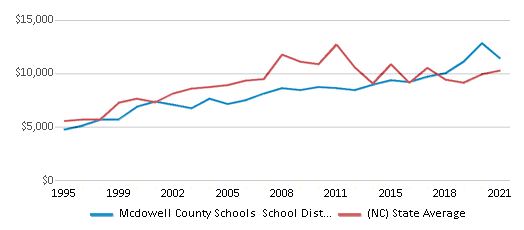
Spending / Student
$11,818
$11,612
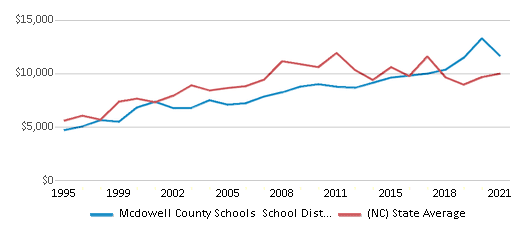
Best Mcdowell County Schools School District Public Preschools (2025)
School
(Math and Reading Proficiency)
(Math and Reading Proficiency)
Location
Grades
Students
Rank: #11.
Marion Elementary School
(Math: 65-69% | Reading: 50-54%)
Rank:
Rank:
8/
Top 30%10
209 Robert Street
Marion, NC 28752
(828) 652-2141
Marion, NC 28752
(828) 652-2141
Grades: PK-5
| 356 students
Rank: #22.
Old Fort Elementary School
(Math: 50-54% | Reading: 55-59%)
Rank:
Rank:
7/
Top 50%10
128 Mauney Avenue
Old Fort, NC 28762
(828) 668-7646
Old Fort, NC 28762
(828) 668-7646
Grades: PK-5
| 319 students
Rank: #3 - 43. - 4.
Eastfield Global Magnet School
Magnet School
(Math: 55-59% | Reading: 45-49%)
Rank:
Rank:
6/
Top 50%10
170 Eastfield School Road
Marion, NC 28752
(828) 652-3730
Marion, NC 28752
(828) 652-3730
Grades: PK-5
| 274 students
Rank: #3 - 43. - 4.
Nebo Elementary School
(Math: 55-59% | Reading: 45-49%)
Rank:
Rank:
6/
Top 50%10
254 Nebo School Road
Nebo, NC 28761
(828) 652-4737
Nebo, NC 28761
(828) 652-4737
Grades: PK-5
| 334 students
Rank: #55.
Glenwood Elementary School
(Math: 50-54% | Reading: 45-49%)
Rank:
Rank:
6/
Top 50%10
1545 Old Hwy 221 South
Marion, NC 28752
(828) 738-4220
Marion, NC 28752
(828) 738-4220
Grades: PK-5
| 429 students
Rank: #66.
North Cove Elementary School
(Math: 45-49% | Reading: 45-49%)
Rank:
Rank:
5/
Bottom 50%10
401 American Thread Road
Marion, NC 28752
(828) 756-4342
Marion, NC 28752
(828) 756-4342
Grades: PK-5
| 221 students
Rank: #77.
Pleasant Gardens Elementary School
(Math: 50-54% | Reading: 40-44%)
Rank:
Rank:
5/
Bottom 50%10
100 John Roach Drive
Marion, NC 28752
(828) 724-4422
Marion, NC 28752
(828) 724-4422
Grades: PK-5
| 309 students
Rank: #88.
West Marion Elementary School
(Math: 40-44% | Reading: 35-39%)
Rank:
Rank:
4/
Bottom 50%10
820 Marler Road
Marion, NC 28752
(828) 738-3353
Marion, NC 28752
(828) 738-3353
Grades: PK-5
| 393 students
Recent Articles

Year-Round Or Traditional Schedule?
Which is more appropriate for your child? A year-round attendance schedule or traditional schedule? We look at the pros and cons.

Why You Should Encourage Your Child to Join a Sports Team
Participating in team sports has a great many benefits for children, there is no doubt. In this article you will learn what those benefits are.

White Students are Now the Minority in U.S. Public Schools
Increasing birth rates among immigrant families from Asia and Central and South America, combined with lower birth rates among white families, means that for the first time in history, public school students in the United States are majority-minority. This shift in demographics poses difficulties for schools as they work to accommodate children of varying language abilities and socio-economic backgrounds.





